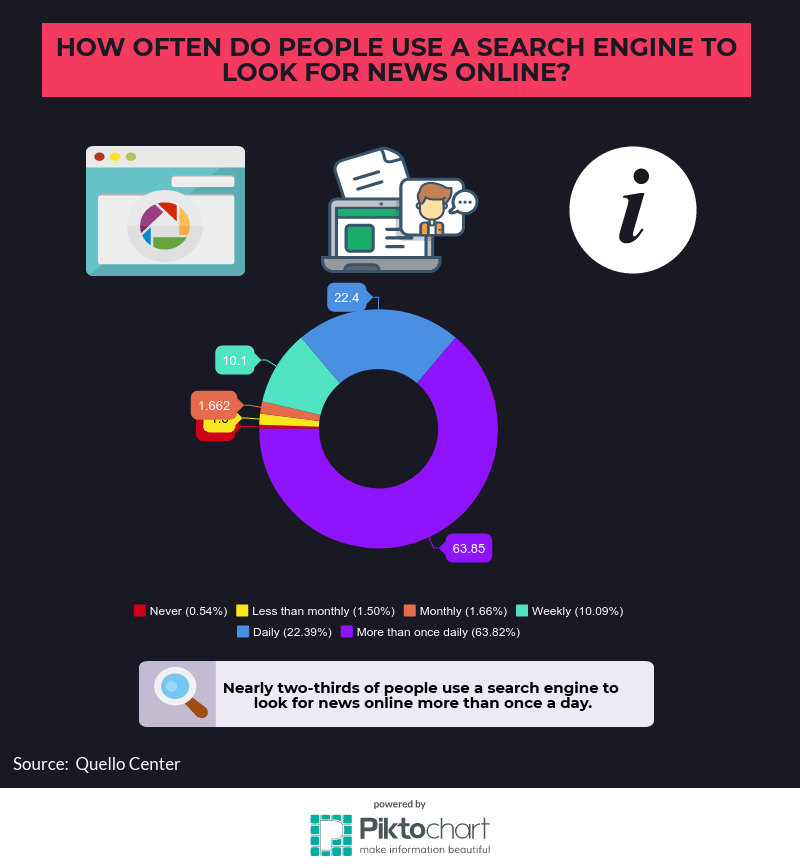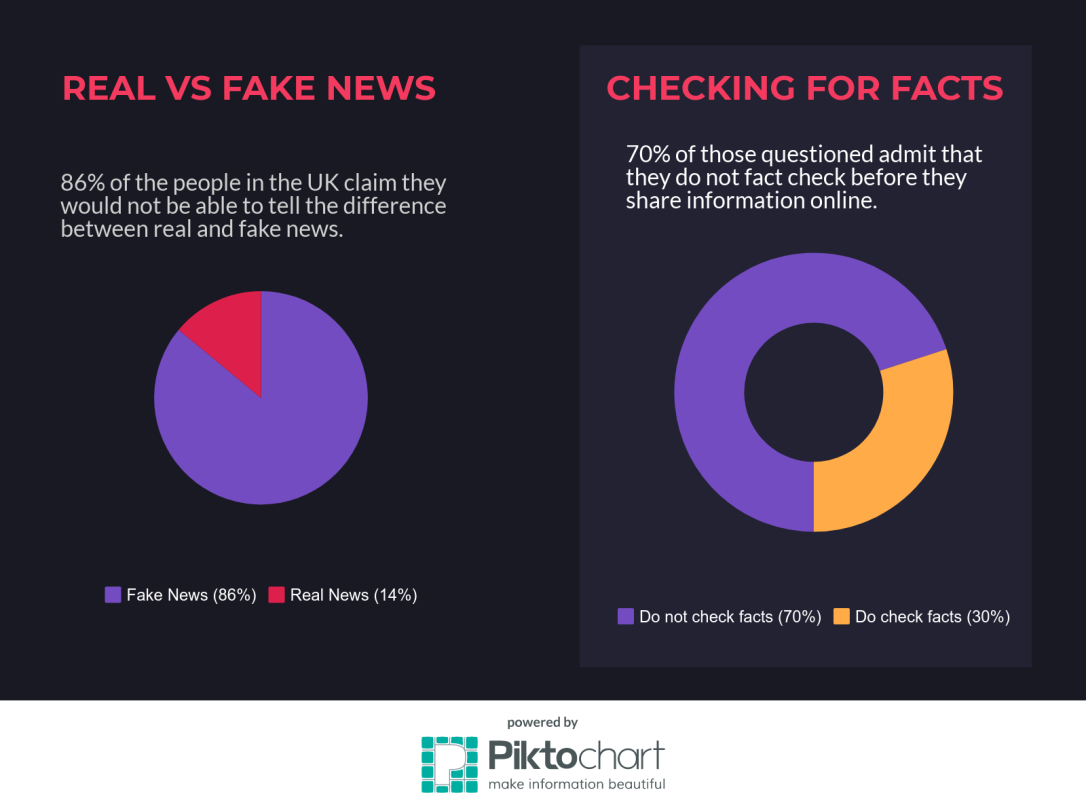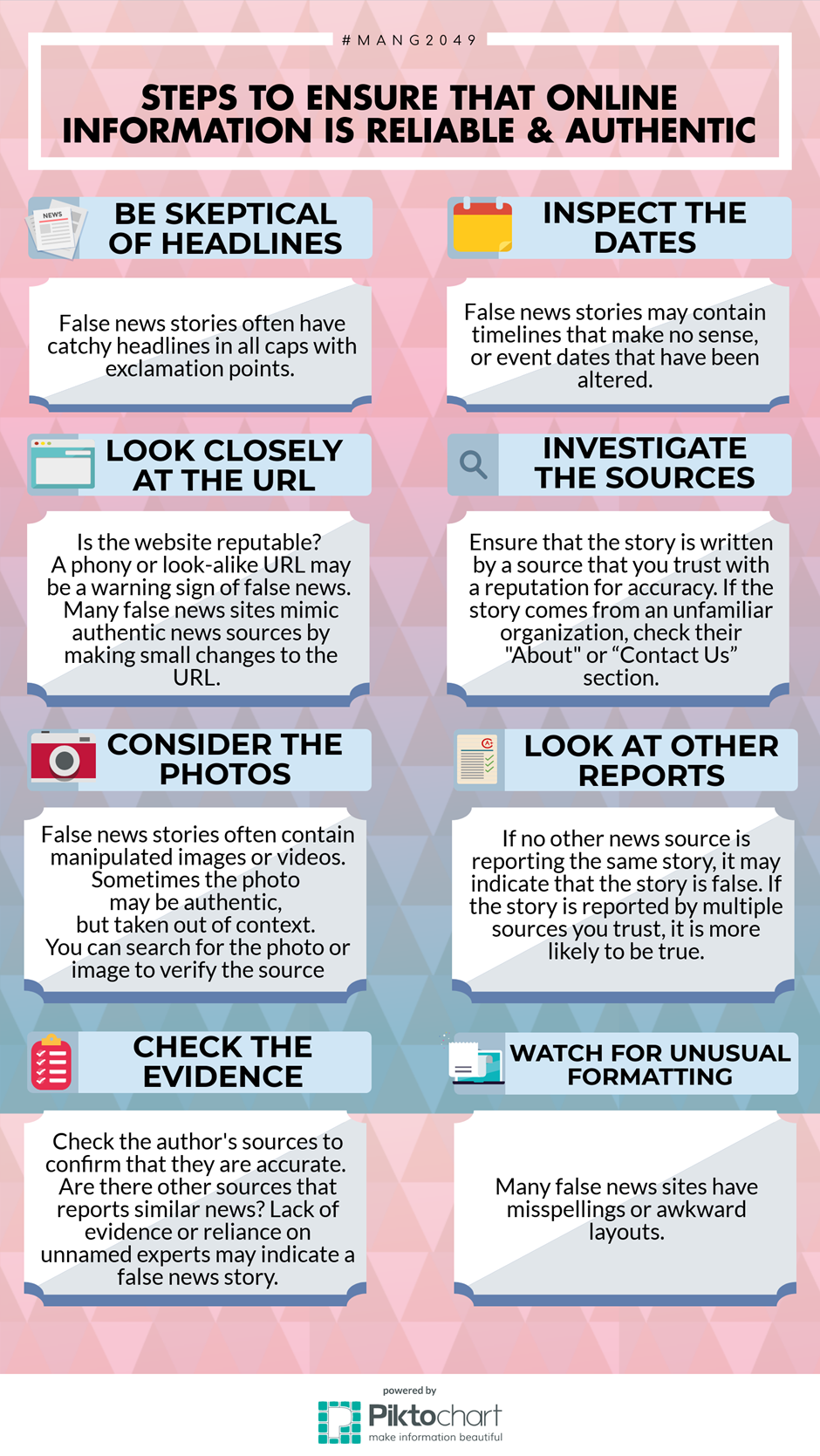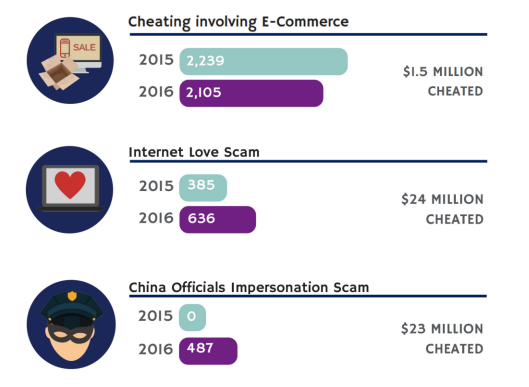With the advent of the Internet, Internet resources have become a major source of information that is used for spreading information in manifold formats through Internet technology. Majority of information seekers rely on Internet resources to accomplish their task.

Self-Produced using Pikochart ; Data Source from Quello Center
Let’s face it, we are all completely obsessed with social media and searching for information online. But finding reliable and authentic news from the Internet is a challenging task. There is multitudinous information on the internet, but how do we know if the information is reliable and authentic? Telling the real from the fake is now a major challenge in the digitally-connected information society.

Self-Produced using Pikochart ; Data Source from BCI ; Survey Done by McAfee
An example of a fake news:

Source: Business Insider Nordic
Therefore, it is vital that we evaluate the reliability of the information obtained from the Internet. It is more about being wary and verifying information; combining resources to validate the source of information.

Self-Produced using Pikochart ; Data Source from Facebook
Apart from fake news, online communication has become an integral part of most of our lives with social and online dating platforms. Sexual predators and scammers are using false identities to prey on the vulnerable. There is an increase in e-commerce scams in Singapore. One example would be internet love scam where women approach men on social media asking them to buy gift cards, in return for sexual services that they do not get.

(Source: Singapore Police Force)
I have always believed that the internet is a brilliant way to discover new things, however, we are prone to fake news. Thus, it boils down to being discerning of the content we see and expanding our news source. Being a generation that is given the opportunity to easily get a chance to open our minds to other viewpoints, it will be a shame to close ourselves off in a little-filtered bubble.
Abraham Lincoln: “Don’t believe everything you read on the Internet”
No. of Words: 300
References
Dutton, William H. and Reisdorf, Bianca Christin and Dubois, Elizabeth and Blank, Grant, Search and Politics: The Uses and Impacts of Search in Britain, France, Germany, Italy, Poland, Spain, and the United States (May 1, 2017). Quello Center Working Paper No. 5-1-17. Available at SSRN:https://ssrn.com/abstract=2960697
Facebook.com. (2017). Tips to Spot False News | Facebook Help Centre | Facebook. [online] Available at: https://www.facebook.com/help/188118808357379?qp_instance_log_data%5Brandomization_seed%5D=1492253759&qp_instance_log_data%5Bos_type%5D=Windows&qp_instance_log_data%5Bbrowser_name%5D=Chrome&qp_instance_log_data%5Bbrowser_ver%5D=56 [Accessed 15 Nov. 2017].
FutureLearn. (2017). Media Literacy – Learning in the Network Age – University of Southampton. [online] Available at: https://www.futurelearn.com/courses/learning-network-age/3/steps/263021 [Accessed 15 Nov. 2017].
FutureLearn. (2017). Page from Learning in the Network Age – University of Southampton. [online] Available at: https://www.futurelearn.com/courses/learning-network-age/3/steps/263024 [Accessed 15 Nov. 2017].
HAN, L. (2017). Spike in online scams but overall crime rate still low. [online] The Straits Times. Available at: http://www.straitstimes.com/singapore/courts-crime/spike-in-online-scams-but-overall-crime-rate-still-low [Accessed 15 Nov. 2017].
Kaushik, A. (2017). Brazilian Journal of Information Science: Research Trends, [online] 11(3), pp.61-62. Available at: http://www2.marilia.unesp.br/revistas/index.php/bjis/index [Accessed 15 Nov. 2017].
Psychology Today. (2014). Can You Really Trust the People You Meet Online?. [online] Available at: https://www.psychologytoday.com/blog/close-encounters/201407/can-you-really-trust-the-people-you-meet-online [Accessed 15 Nov. 2017].
Singapore Police Force. (2017). Statistics. [online] Available at: https://www.police.gov.sg/news-and-publications/statistics [Accessed 15 Nov. 2017].
Thebci.org. (2017). 70% of people in the UK admit they risk spreading fake news | BCI News. [online] Available at: https://www.thebci.org/news/70-of-people-in-the-uk-admit-they-risk-spreading-fake-news.html [Accessed 15 Nov. 2017].


Hey Tanya, good use of self-produced infographics as it made the statistics very clear. It was shocking to see that 86% of the people in UK would not be able to tell the difference between fake and real news while 70% would not check the facts before sharing with friends. This shows how severe the situation is at currently and that how we should always be cautious and take good procedures to ensure that what we are reading is authentic, from the steps in your infographic. We definitely would need to develop our critical thinking and not trust every source we see online. From your internet scams examples, have you ever been tricked online before? Or perhaps you saw scams, claims or news spread online and knew that they were fake?
LikeLike
Hi Yu Ping! Thanks for visiting my blog! 🙂
Yes, I myself was shocked by the statistics as well. In addition to that, a news report by Stanford Research shows that many students had a hard time distinguishing advertisements from news articles or identifying where the information came from as well!
Personally, I have been tricked online before. One example was joining an online survey scam that offers $500 (supermarket vouchers). The survey consisted of questions asking about my shopping habits and I had to forward the links to 10 contacts. The final step was to fill in my personal details. I guess the purpose of this was to obtain as much personal information for marketing purpose. After this incident, I came across similar scams offering FREE flight tickets to Europe and Ikea vouchers. I became more alert and cautious about the information I shared online after this incident. One way that we can verify before joining the contest would be checking the website of the organiser and call the organisation to check if the contest are authentic. 🙂
Cheers!
Tanya
LikeLiked by 2 people
Omgosh that sounds horrible 😦 hopefully these organisations have been reported and dealt with! I agree with you, that we must check the website and organization properly before taking part no matter how legitimate the posters and procedures look.
The most memorable ‘scam’ that I was involved in was of a online game I’ve played, where a random user approached me and befriended me, then asked me for my account details as he told me his as well. I was so gullible then (probably 9 years old??) so I didn’t know I wasn’t supposed to share the details and next day my character was hacked and every item and game money I had gone 😦 From then on I carefully protected my own privacy from online users. Learnt it through the hard way :”)
Thanks for the quick reply!
LikeLike
My pleasure! 🙂 It seems that this scam is still circulating on the internet. While typing this comment, I was redirected to a pop out page indicating I have won a supermarket voucher. Too much of a coincidence! Oh my poor you, you must be extremely upset at that age! You definitely learnt it the hard way by losing all your precious items and money!
LikeLike
Hi Tanya, the post was informative and the charts have given the figures to support your statement. I want to share my experience to evaluate the online information that one of my “friend” was added my into a shopping group on Facebook. There are many account sharing the same news, it’s more like spamming. Therefore, I clicked to their account and find out the creation date and the post were uploaded within a day.The profile picture was the other users which i find out on Google. Which is not make sense. This story tells me that don’t simply add people on Facebook and do fast check about their account before sharing the post. Do you have experienced in evaluating the fake news?
Next, I think that the government should filter the suspicious online information to avoid the increasing crimes on the internet. Do you agree that? Or it might be misuse by the authority to filter the “unfavorable news”?
Overall, I enjoyed reading your blog. Thank you!
Word Count: 149 words
LikeLike
Hi Kwan Chein! Thank you for reading and taking the time to comment on my post!
Glad to know that you evaluated the account of the user, otherwise there is a tendency that you might be scammed.
Personally, I do have some personal experience to share. There was once I was scrolling Facebook and came across a post titled “Rowan Atkinson aka Mr Bean was dead”. The moment I saw that news I was shocked as Mr Bean was one of my favourite actor and I immediately clicked on that post. After reading I was upset BUT I went ahead to google “Is Mr Bean dead?” to my relief that the news was a HOAX.
I do agree that the government should filter suspicious online information but there is a limit to how much the government can do. There are too much fake news on the internet and it might be impossible to filter out all the fake news on the Internet.
From my search, I found that Singapore’s government has plans to impose new laws on fake news which is expected to be introduced in 2018. You may like to read more about it: http://www.channelnewsasia.com/news/singapore/new-laws-on-fake-news-to-be-introduced-next-year-shanmugam-8958048
Cheers!
Tanya
LikeLiked by 1 person
Thanks for the information, Tanya. That’s why we really need to be more careful about the news on the social media.
I think the laws have been imposed by the government will definitely decrease the crime rate on the internet!
LikeLiked by 1 person
My pleasure Kwan Chein! 🙂 Yes, we ought to be careful. Yes, I am glad the government is putting in efforts to decrease the number of fake news online.
LikeLiked by 1 person
Hi Tanya! Nice reading your post on topic 2 and totally agreed on the points you made. I like how you summarized by the chart and pictures as it is clear and help me to understand your topic better. I strongly agree about there is multitudinous information on the internet, but in order to spot the information is reliable and authentic is now a major challenge in the digitally-connected information society.
I would like to share the fake news in my country which is they created the fake news to topple former Jakarta Governance. The syndicate allegedly charged $7,132 for each project that involved publishing and spreading hate speech.
I think it’s our job our part to be informative towards the people who share the fake news. For example one of your photo (steps to ensure that online informative is reliable and authentic).
All in all, it was a good read!
(151 Words)
Reference
SOERIAATMADJA, W. (2017, August 6). Indonesian police probe alleged fake news factory’s protest links.Retrieved from The Straits Times: http://www.straitstimes.com/asia/se-asia/indonesian-police-probe-alleged-fake-news-factorys-protest-links/
LikeLike
Hi Simon! Thanks for dropping by! 🙂 Yes it is definitely a challenge, at times it can be difficult for me to differentiate if the authenticity of the news. Thanks for sharing the fake news that is happening in Indonesia. I hope the person received warnings about this matter to prevent subsequent fake news from occurring.
Did you know that business are making use to Filter Bubbles to personalize content that is suitable for you? With Social Amplification, social media has become a powerful tool for businesses to deliver a message to its consumers. There have been hundreds of articles online about getting rich quickly, describing how people made tons of money in a week with minimal effort. They can be found in just about any click-bait sponsored article post. Have you came across any of these click bait articles? Did you verify thereafter? If so, how did you verify it? Here is an article that you could read more about “get rick quick scam”. http://www.channelnewsasia.com/news/singapore/billionaire-peter-lim-lodges-police-report-over-get-rich-quick-c-7890418
Would love to hear from you!
Cheers!
Tanya
LikeLike
Thanks for the information
Yes, i have received many “Get Rich Quick Scheme” and honestly speaking, we all want to be well off, we all want to be rich, wealthy, have that dream car or house, live the dream life and be happy. Thus, this is the best way to scam people.
However, they have some common traits which include but not limited to the following;
1. They only talk about the benefits and what you stand to gain in the business.
2. They never tell you the risks involved. in such business. Every business has some risk.
The bitter truth is that get-rich-quick schemes are nothing but a complete scam.
There is no easy path to success, if you must be successful, then you should be ready to work hard and start thinking like the rich. Get-rich-quick is not and never will be the answer.
Here is an article about “Avoiding Get-Rich-Quick Schemes:
http://www.cbn.com/finance/crowngetrichquick.aspx?mobile=false
Cheers!
Simon Foo
LikeLike
Hi Simon! Thanks for your reply!
Yeah, I believe hard work pays off. Nothing is for free in this world. Such scam should be banned and investigated by the authorities.
Have a great weekend ahead!
Cheers!
Tanya
LikeLike